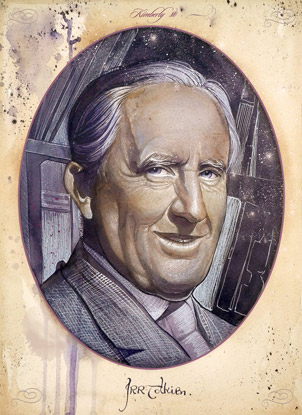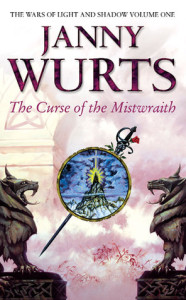Bring on the controversy, and strap in for a devil’s advocate view through some eye-opening history, because certain game-changing books were never ‘discovered spontaneously.’ Notably, the profile of these landmark fantasy authors share a profile of mature scope and depth, and stories that open with adult protagonists.
First, busting the myth that Tolkien was ‘discovered’ and broke out by readership word of mouth is not true: Betty Ballantine’s actual account relates how Tolkien’s career blossomed through a publishing scandal.
Allen Unwin first published Professor Tolkien in Great Britain in hardbound. At the time, copyright law in the USA protected up to 2000 unbound copies of a book to be imported as loose pages, to be bound and sold by a US firm. Houghton Mifflin handled Tolkien this way, in routine partnership with Allen Unwin. Nobody paid much attention, though Ian and Betty Ballantine loved the story and offered for paperback rights. Professor Tolkien declined, avoiding what he considered a tacky American edition. Over a period of ten years, when the British edition underwent reprint, repeated lots of unbound sheets of were brought in and sold by Houghton Mifflin in quiet obscurity. Enter a certain paperback publisher’s back room lawyers, who tracked publication records, trolling for the loophole that titles compiling more than the allotted 2,000 loose sheets slid into the public domain. On that legal technicality, Tolkien’s Lord of the Rings was reprinted as the very lurid paperback professor Tolkien had wished to avoid, and worse, with no royalties owed to the author.
The press scandal put Tolkien’s face on Time magazine, and public furor over the professor’s predicament changed in the law
The Ballantines seized on the opportunity, offered Tolkien a paperback contract with advance and royalties, then launched a campaign to expose that copyright clause as unethical. The press scandal put Tolkien’s face on Time magazine, and public furor over the professor’s predicament changed in the law, closing the loophole forever. Betty Ballantine acknowledged this as the impetus that shot Tolkien’s works from obscurity to widespread awareness. The original Ballantine paperbacks have a green box on the back cover, asking readers to favour the edition that paid the author a legitimate royalty.
No question, Tolkien’s works are an undisputed classic, time tested in defining the modern fantasy genre. Yet without the exposure on national news, could his influence have broken out to seed an explosive phenomenon?

J.R.R. Tolkien by EstudandoAteh
Atop Tolkien’s success, Ian and Betty launched the Ballantine Adult Fantasy Series, reviving interest in Lord Dunsany, Eddison, and resurrecting Evangline Walton from obscurity. Then LeGuin’s Earthsea trilogy and Stephen Donaldson’s Thomas Covenant arrived in paperback, standout work noticed readily, before Tolkien clones stuffed the market and the rush of gaming tie ins shot genre fantasy in paperback out of its infancy.
The landslide aftershock saw fantasy titles with deepest complexity, particularly those by authors who did not jump start their careers by miming Tolkien, all but buried. Jane Johnson, UK editor at HarperCollins arose as a champion of fantasy portraying adult protagonists and mature concepts. She launched Megan Lindholm (now Robin Hobb), bought Guy Gavriel Kay’s Tigana, published Barbara Hambly, Katherine Kerr, and was the acquiring editor for my Wars of Light and Shadow series, as well as the visionary launching Mark Lawrence. Her tenacity spearheaded the change from pictorial covers to graphic design, in belief adult fantasy could appeal to a wider audience. She became a signature player in GRR Martin’s launch, and this interview highlights the slow burn history of A Song of Ice and Fire, spanning a decade or more, in a battle to keep a trend setting fantasy in print long enough to realize its potential. Jane’s best ammunition became the overwhelming size of the advance. The publisher had to persist, reissuing with new covers again and again to keep the books fresh, or eat the loss.
Why during this period did so many excellent female authors change their bylines?
What made Martin’s work, and the evident literate quality of Kay such an uphill push? Why during this period did so many excellent female authors change their bylines, mid-career, and why did some truly excellent titles with adult protagonists fall under the radar entirely? (Authors like Matthew Woodring Stover, Lee and Miller’s Liaden books, Rosemary Kirstein’s Steerswoman series – the list is long and in some cases, still sorrowfully unlamented).
Rising costs and the collapse of the independent distributors took their industry toll in the nineties, but more than these, the insidious effect of computer tracking drastically shortened the time span for new work to establish itself. Instant access to sales figures let publishers and chains cherry-pick, ditching the effort required to build a slow burn approach, and enabling a quick shift toward immediate sales. One editor summed up the result rather baldly: buy up cheap books by new talent, throw the debut books at the wall like spaghetti, see what sticks, discard the rest.
The list of talent flushed swept away in this period includes a stunning array of talent: often the casualties were mature stories, written with adult protagonists.
Mergers swept the industry. Multi-national corporate outlook demanded higher profit margins, (double in fact, the expectations before) and still faster returns, driven by the Harvard business model. Johnson’s, and others, championing of sophisticated works with low volume sales became harder. Judicious editors could no longer acquire without a profit and loss statement ahead, detailing the numbers of projected return. Works that needed longer to catch audience, that did not follow the trend, dropped out or all but disappeared. Signal works, renowned today, hit such a wall: Steven Erikson’s Malazan had an early debut in the USA, was abandoned by the original publisher, and remained available only in the UK, until a re-launch a decade later reintroduced him to the marketplace. Malazan’s first readers were few and scattered, and no matter how enthusiastic, the buzz over simpler, coming of age quests incited the numbers. A work now lauded for extreme complexity and adult almost passed by the wayside.

Art from Tales from Earthsea
More traditional fantasy series became engineered by high profile campaigns: the publisher of the notable major gave away free copies in mind boggling quantity, an unprecedented gamble to jump start sales figures. Several others were awarded enormous advances. To recoup investment, books were (and are still) rigged by means of what is called ‘co-pay’ – a kickback paid to the chains ensures that title is featured face out, on an end-cap or new release shelf. A notable case had a launch display covering the entire front of a major chain. A publisher could stake out a book’s visibility to build momentum, aimed at a ready audience.
Enter the question: has the freewheeling outreach of the internet actually made it easier for readers to find groundbreaking books? Could a slow burn break through title still miss?
Word of mouth is still the best strategy, but – for a work to crawl out of obscurity, how does the buzz reach a book?
Giveaways and deep discounts and features offered by online sellers have entered the fray. With instantaneous sales tracking feedback, and search algorithms, the rapid dissemination of information favours what people are talking about. Word of mouth is still the best strategy, but – for a work to crawl out of obscurity, how does the buzz reach a book? Friends read what friends know about. Social media trends concentrate what is already ‘discovered’ whether seeded by hype or mass volume. Major publishers recently gathered to survey industry change. They determined internet sales became driven by people shopping what they already knew. Books already talked about, books already ‘discovered.’ Not long back, a blog post contributed to by about ten name writers, discussed how they sorted independently published titles for the better books – every last one relied on SOMEBODY ELSE having read and recommended the title to set it apart.
Browsing an unknown book on the internet requires the foresight that it is there! More, public opinion shoves the book’s data right into your face: ratings, reviews, numbers – crowd opinion leads the barrage. A few bloggers have readily admitted they cover titles that are talked about to increase likely traffic and commentary. Mention of titles outside the popular mainstream are few and scattered, and no matter how enthusiastic – amid the chorus, does the ‘slow burn’ visionary sort of book actually capture its potential niche?
Internet buzz over books that ‘take’ quickly drive numbers, and computer tracking tells a publisher, in real time, what is taking off – the downside risk: authors that don’t hit this accelerated trending get dropped, faster than ever before. Would the slow burn, underground game changer that caught on in the course of a decade later happen as readily now?
While readers continue to browse at used book shops, the unseen curve becomes more insidious. Many excellent books launched without hype, the low advance/small press run title that turned out to be a great book became keepers – these gems seldom to never reach a charity shop. The available selection is already stuffed with huge press runs, re-circulated again and again, and worse, unknown books recycled precisely because they offered nothing special. Once, that Megan Lindholm debut, or that Guy Gavriel Kay standalone, or even, that George R.R. Martin book that failed to surface here. Libraries may seem an ideal alternative, except the small press run, the groundbreaking idea may never have been printed in hardbound, and even if so, the library budget would trade the low profile book for one with high demand.
Do the drivers behind social media even recognize maverick gold? Given the runaway influence of trending influences on the internet, could the next Malazan, the next Tolkien, the next Martin or Hobb or Kay be overlooked because slow burn books may lurk in obscurity for that decade or more? Can books with no budget survive the curve and can today’s editor walking cutthroat line of corporate profits, or the small press with tight purse strings, stay the distance where the early numbers don’t rack up? Does internet discourse help or hinder slow burn word of mouth, or is it feeding the mindset of sheep?
If social media works, and if e books are the great leveller, why are some authors, (like Carol Berg) writing sophisticated prose with adult protagonists pursuing the gray complexities of flawed moralities not climbing to the top of the charts? Why isn’t the stylistic brilliance and dark tone of Karin Lowachee’s The Gaslight Dogs read as widely as Lawrence’s Prince of Thorns?




So much love for this post.
I admit, as a blogger, I do often focus on larger names, books that are getting released soon or have just been released, and books that, quite honestly, don’t need my review or my publicity to sell well. Thinking about it that way, it makes a lot of what I do seem almost irrelevent; if much of what I review would sell just as well without me saying boo about it, the same can be said about a lot of reviewers. A lot of us put focus on the titles that are making waves long before we even read the first word.
But every now and again I come across books that really wow me, and I wonder why nobody else seems to have shed any light on them. They’re good enough to deserve better than the relative obscurity they’re in, better than a few scattered reviews here and there. I wonder sometimes why they don’t get better publicity. Was there no budget to spread the word? Did people just pass them over in favour of better-known books and authors? Do stores and libraries not bother to order copies because the authors are relative unknowns? It’s not the quality of these books that are holding them back.
It’s nice to believe in the stories of undiscovered genius suddenly rocketing to the top. It lets people think that someday, it could happen to them. That they just need to wait for the right person to come along and read their book and go, “Wow, this is the best thing ever, and I need to get everyone I know to read it!” I think that’s one of the big things that drives the self-publishing industry, really. But it seems like it’s an uphill battle, swimming against the current, when the focus is all on what sells now and not as much on what will keep selling a decade from now.
I remember when my book was coming out, going into Waterstones, the major UK chain of booksellers and finding Prince of Thorns on the new release shelf in the SFF section. To get to it I had to walk through the main body of the shop past a free-standing bookshelf set right in the walk space. The bookshelf was seven foot tall and every inch of every shelf was occupied by an outward facing copy of Erin Morgenstern’s The Night Circus. Literally a hundred of them. I also heard that the book was being promoted at book fairs with teams of circus acrobats …
Obviously the quality of the book inspired the dedication of a huge promotion budget to it. A budget that made me as envious as my own probably made some other authors feel (I was on the new release shelf after all, and early proofs of my book had been given away free with GRRM’s A Dance With Dragons).
The Night Circus far outsold Prince of Thorns (213,000 goodreads ratings to 18,000), just as Prince of Thorns far outsold some of those other books with smaller pushes behind them. The million dollar question – which nobody can truly answer – is did the quality that drew those pushes also sell the books? How much of the sales were due to the great start they were given? If you swapped out those two books for two others that floundered would they have done just as well? Or did the skill of those making the selections give us books that could carry the expectations?
We’ll never know. The truth undoubtedly is that the push helps, but quite how much, nobody knows.
Word of mouth sells books. No argument. But how much of it is the word of mouth evidenced in the blogs (like this one) that review online, and how much is the vast but inaudible chatter of one friend to another over a beer, or coffee, or water cooler? Does the bloggosphere make the wind or is it a windsock? Another unknowable.
As terrible as they can be, Amazon was responsible for me picking up several “new to me” authors through their recommendations. “People who bought this also bought…” It just takes slightly more purpose than accidentally stumbling across something new in a store while you were looking for something else. ;) I found both Kate Elliott’s then-new Crown of Stars and Catherine Asaro’s Skolian series that way. And for what it’s worth, I push Carol Berg’s books at everyone I meet, hoping to drag more people into fandom with me. ;)
Ms. Wurts, what an incredibly elegant piece. Thanks so much for sharing. I first came to your writing through the novels you co-wrote with R.E.F. In any case, it seems that you’ve touched a nerve. Even in the great leveling world of ebooks, self published or otherwise, newness is a great trump card (as is lower price).
“Internet buzz over books that ‘take’ quickly drive numbers, and computer tracking tells a publisher, in real time, what is taking off – the downside risk: authors that don’t hit this accelerated trending get dropped, faster than ever before.”
Very very true. The other day I actually came across the blog of a writer who had managed to get her book published, but because it didn’t get enough hype, she decided after years and years of working on it, to stop and start a new project. I thought it was very sad, but then again, that’s how it works, I guess. It’s a terrible thing but are there really any solutions to it that anyone can think of?
Just like Mark Lawrence said ^ (by the way, woah, a famous author commented on your blog, dude! /momentarily gazes at you in shock/), word of mouth sells books. It still sucks for those whose books don’t become “famous”, though.
Ebooks are forever. Virtual shelf space is unlimited. And the playing field is much, much more level at electronic retailing sites.
Slow burn can certainly still work; just not in brick and mortar settings, not any more. If publishing houses can’t see that then they will have only themselves to blame when dropped midlisters give them the cold shoulder the next time around.
Wow; what a great post! I’ve never read a piece that goes into such depth about the history of the genre.
I hear again and again that word of mouth is one of the best ways to sell a book. A good product, combined with marketing diligence, means that authors don’t have to rely on traditional publishing as much as they did before the digital age. Thanks for the post.
[…] …on “The Unrecognised Trajectory of Slow Burn Success.” […]
There are a lot of reasons why slow burning success doesn’t work on the internet, of which this blog helps perpetrate a few of them. The biggest of which is the (false) idea of fracturing of audience.
There isn’t a giant dissemination of any audience, in any media, what has happened instead is the loss of the causal audience, while the larger consumers instead form into a hive mind of sorts. People are no longer picking books based on reviews or if it’s worth reading but instead are picking them based on what everyone else is talking about. These communities don’t keep talking about new(er) stuff after a few weeks, focusing instead on the same old same old. Simply because that is what the rest of the people are talking about.
People care more about being part of the conversation than actually using their time wisely. Take reddit, probably the biggest community on the internet for Fantasy. Any thread you go into where people are asking for book suggestions (no matter what type of books the OP asks for) nets basically the same 15 or so suggestions. Maybe one or two slightly different ones. It doesn’t matter what type of story you want, you’re going to get a book by Sanderson suggested to you. Wheel of Time and Game of Thrones might get tossed out, same with Jim Butcher stuff. Don’t like Grimdark? Who cares here comes a Mark Laurence book, and forget about how terrible the first book is, Michael J. Sullivan’s books are going to get sent your way. One offs that focus on quality don’t matter to these average readers, and because there are so many of these lazy readers newer stuff will never have enough clout to be pushed to the top.
The low bar to entry also hurts quality books. Websites now have more books than ever to focus on and cover, giving less time to cover quality books in detail. Sites I use to be able to trust to give me good suggestions have drown in trying to cover as much as possible. Again take reddit, AMA’s and Author spotlights use to be reserved for authors who had written multiple books, so you knew at least they had some fans.
Now, it’s part of release plans to have some authors do AMA’s, weakening the format and making it frustrating to discover new, well written books. Its gotten so bad in the last few months that its become impossible to gather any understand of the quality of books based on these, as many of the same questions are recycled over and over with little of the book being discussed.
Finally, and this one is the biggest. The politically bullshit within the SFF needs to end, full stop. Tor.com has become unreadable because they are pushing this hyper progressive agenda within every blog post, often commenting on subjects they normally don’t touch (comic books, video games) to address something without knowing the full with of the situation.
Talking about female authors is fine, what isn’t is constantly talking about how we need more females to get published and promoted by SFF publishers. This ignores the data (http://torbooks.co.uk/2013/07/10/sexism-in-genre-publishing-a-publishers-perspective/) that shows that Females just aren’t submitted as much work to publishers.
The biggest problem this thinking presents is that it marginalizes the great female authors we already have. Kate Elliott posts here a few times, and shes great, I love her Spiritwalker trilogy and think its better than Mistborn by leaps and bounds. Robin Hobb’s books are not my cup of tea but very well written.
Instead of talking to current authors who are fantastic we get posts like “why is fantasy all about a farmer boy” or “why is fantasy ruled by old men”. Its stupid and short sited, showing a lack of knowledge by the writer.
The problem with these political posts (and hence my anger) is that it presupposes that women can only write women and men can only write men. Else, why does it matter how many males/female writers are there. Jay Lake’s Green series is fantastic, yet is rarely touched upon. Does him being a man stop him from understanding how to get in Green’s head? Does Sanderson being a male mean Mistborn would be any less popular? Would the nearly equal time given to the the female lead in The Way of Kings be any less or more if it was written by a female?
No, and instead of going out and fixing these problems people get on the internet and bitch. Which in turn brings up out the negative aspects of community, which in turn, marginalizes the books that truly need the word of mouth to survive.
The Fantasy community has become a cesspool of anger and hate, thanks to the discussion of gender politics. Both sides have a “you’re either with us or against us mentality” refusing to admit there’s an inbetween (or that some people don’t have the mental space to care).
To increase word of mouth, you need to marginalize the these lesser aspects of the community. In a lot of ways there is one golden rule of the internet, out of sight out of mind. Instead of posting about how we need more females, more focus on good books, highlight the good books instead, highlight authors who knock there stuff out of the park.
No new quality book the previous week? instead cover a Tigira again, talk about how returning to that world make. No news for the day, mention to everyone that they should go read that Megan Lindholm book that they might’ve missed.
These books don’t just need word of mouth, these books need champions, people to push them ever after everyone else has moved on. Until communities clean themselves up, allow for a higher barrier to entry, and cut the crap, its going to be nearly impossible to stand out within all the noise.
Personally, I read somewhere between 80-100 books a year, and have done so for the last 6 years (since I started college). For the first 4 years 60-70% of those books were Science Fiction and/or Fantasy, I read basically anything that got a positive review, using the library as a first pass and then buying everything I enjoyed. Last year, and the first two months of this year, I’ve found getting transported less and less to fall away worlds of magic and science, not because my tastes are changing, but because it’s harder to navigate now.
If social media works, and if e books are the great leveller, why are some authors, (like Carol Berg) writing sophisticated prose with adult protagonists pursuing the gray complexities of flawed moralities not climbing to the top of the charts? Why isn’t the stylistic brilliance and dark tone of Karin Lowachee’s The Gaslight Dogs read as widely as Lawrence’s Prince of Thorns?
Good questions, all.
I do think that, pace Alex, there IS a tilted playing field toward white male authors. Skill beats will, and an author must write, but I think, all other things being equal, Mark Lawrence is going to have a much easier time than a genderflipped version of him, even with the same book. Its not the whole story, but I think its a factor.
And even writers on the “easiest difficulty setting” can still fail to deliver, or not reach an audience with a deserving book.
[…] The Unrecognized Trajectory of Slow Burn Success Absolutely essential essay by Janny Wurts on publisher investment in authors’ careers and the way, in the current market, it’s almost impossible for this kind of investment to happen any more. And then you end up with stuff like this. […]
[…] New York Publishers Still Relevant? Gnome Press Co-Founder Dies Slow Burn Success Writing Advice & Advice That Didn’t Work Book Industry Afraid Of Amazon? Inkshares […]